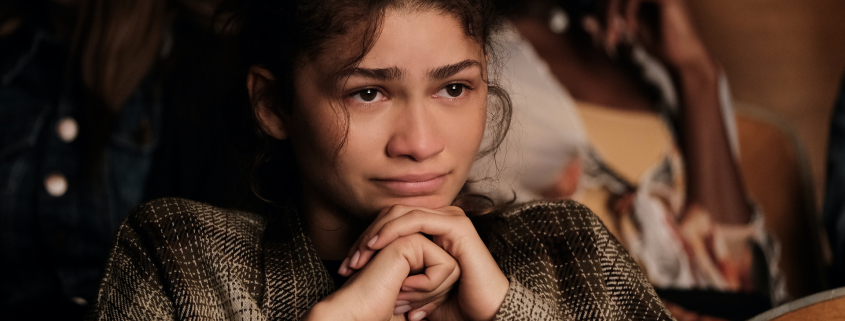Who Cares?: The revival of weekly releases will save television

The final episode of the second season of “Euphoria” aired Sunday night, and even if you haven’t watched a single episode, I’m sure you still know everything that’s happening. From discourse surrounding Cassie (Sydney Sweeney) and Nate (Jacob Elordi) to every last Angus Cloud edit, “Euphoria” has taken over the internet. For the past eight weeks, it has been “Euphoria”’s” world, and we’re just living in it.
No matter your thoughts on the show, it is undeniable that “Euphoria” is the moment.
Even before the season finale, “Euphoria” amassed over 30 million tweets throughout the season’s run, currently making it the most-tweeted show of the 2020s, according to Variety.
Its social media relevance made “Euphoria” an unstoppable force. In a world where shows shy away from running on Super Bowl Sunday, “Euphoria” tackled the challenge head-on and shined brighter than ever, reaching its highest viewership up to that point ever, at 5.1 million live watchers. This was just topped by Sunday’s finale, which reached 6.6 million viewers. The high number was because of social media jokes suggesting that Maddy (Alexa Demie) and Cassie’s fight would be the real Super Bowl showdown.
“Euphoria’s” numbers are incredibly awe-inspiring considering that in 2021, 75% of the highest watched live television programs were football, as the Super Bowl took the winning spot.
In the current crisis of streaming overload, “Euphoria” has its weekly release schedule to thank for its longevity. The 2010s made binge watching the norm, but the 2020s are slowly bringing back the weekly release — proven even further with the success of Disney+ hits such as “WandaVision” and “Loki.”
However, binge watching does not necessarily stop a show’s success — “Squid Game,” which was dropped all at once on Netflix, was easily the most-tweeted show of 2021. For the month of its release, it had the same inescapable quality that “Euphoria” currently has. However, any tweets about the show were more general, mainly thoughts about the show as a whole or an analysis of the entire series, rather than slowly building up each episode.
A show like “Euphoria” wants to be heavily analyzed. It’s not a show to which you can doze off to in bed. When a show is released all at once, it becomes harder to do an in-depth analysis of 10+ hours of television. The weekly release gives people the time to dig into each hourly episode and a whole week to do it before a new episode releases.
Weekly release schedules leave more room for discussion, discourse and the most fun part — predictions. Also, the build-up to an episode creates a sense of community among viewers.
Remember the stress of the week before the release of “Hannah Montana He Could Be the One: Part 2”? Would she choose Jake? Would she choose the absolutely superior option, Jesse? (Yes, I’m still mad about it). The playground was buzzing with anticipation.
The week leading up to Euphoria Sunday takes me right back to that electric playground feeling. TikTok predictors spend their days analyzing the previews trying to figure out every possible scenario.
Sure, having to wait may lead to some disappointing outcomes (i.e. Hannah choosing the dirty cheater Jake over the wonderful, amazing, perfect Jesse). Still, even then, at least the weekly release schedule allows viewers to commiserate with friends, rather than immediately getting thrown into the next plot point.
Time is especially important for a show like “Euphoria,” which deals with dark themes such as addiction and abuse. It is essential to have some time to process each episode. While some people do binge watch it, I personally appreciate having a breather.
Binge watching will never go away. Sometimes it can ever be the preferred method — take reality competition show “The Circle.” The show only takes place over two weeks, so it makes more sense to drop it all at once, rather than stretch it out. It’s the type of show to watch over a weekend, and many people can get behind that. In fact, a poll conducted by IGN in 2021 shows that over 73% of people prefer binge watching to watching weekly.
Binge watching may be able to give an immediate rush of fulfillment and elation (such as immediately getting to know that, in the end, Hannah and Jesse, thankfully, end up together). Still, it can never give the same satisfaction as working through the slow burn to get there. Half of the fun is the work to get to the end and going through the struggle at the same time as the characters. The true beauty of television is connection, and the way to get there is through a build-up, or as Miley Cyrus would say, “It’s the climb.”
Kimberly Aguirre is a freshman dissecting the most off-base entertainment news. Her column, “Who Cares?” runs every other Wednesday.
Correction: A previous version of this article stated that “over 723% of people prefer binge watching to weekly watching. The article now reads, “over 73% of people prefer binge watching to watching weekly.” The Daily Trojan regrets this error.

